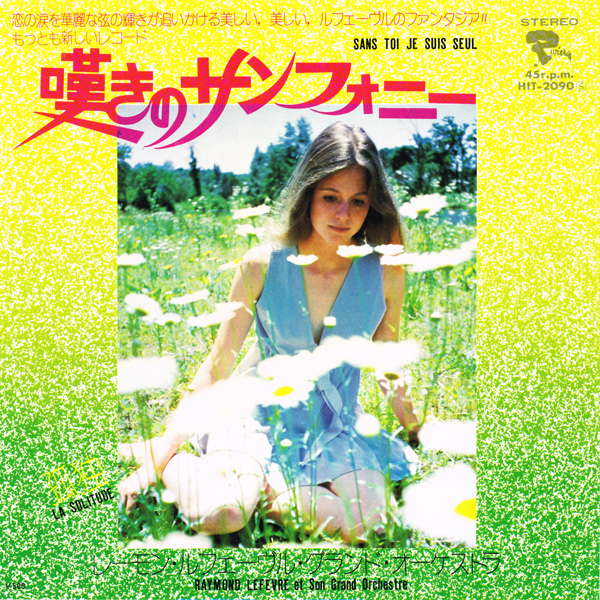45 R.P.M.: SANS TOI JE SUIS SEUL

HIT-2090 S, King Record Co. Ltd., Japan. P '73-3. Recorded by Riviera (France)
- Sans Toi Je Suis Seul (3:26) (Frank Gerald, Patricia Carli)
- La Solitude (3:25) (Leo Ferre)
SLEEVE NOTES:
Have you ever heard of the scent of Raymond Lefebvre? There is a Lefévre fragrance that is different from the others, like Chanel is to Chanel what Guerlain is to Guerlain. There is a Lefèvre fragrance that is different from others, like Chanel has Chanel and Guerlain has Guerlain. While Paul Mauriat makes sharp use of simple sounds, Lefebvre creates a gorgeous sound with overlapping waves of strings around the strings. There is an unrivaled Lefebvre world and fragrance.
Here, let's take a moment to learn a little more about Lefebvre. Raymond Lefèvre was born on November 20, 1929 in Calais, Northern France. From a young age, he was musically gifted and studied at the conservatoire. At first he intended to become a classical flutist, but during his studies he fell in love with jazz and switched from classical to pop music. He arranged for many chanson singers and became famous for his arrangement of Dalida's "Bambino," which led him to write music for the TV musical drama "Palmares de Chanson," among others. In 1968, "Âme Câline" (composed by Michel Polnareff) made the hit parade in the U.S. and made Lefebvre's name unshakeable. It is well known, however, that it was "The Queen of Sheba," not "Âme Câline," that made Lefèvre famous in Japan. Lefèvre's music was accepted by the Japanese not because of its reputation in the U.S., but because it was the music that the Japanese wanted, and this is what gives it a general strength not found in other artists.
The sweet shock we felt with Lefebvre in "The Queen of Sheba" can be felt in all of his works, to a greater or lesser degree.
And now, here it is again, giving us that powerful sensation. The song "Sans Toi Je Suis Seul" was a big hit in France during the summer and fall of 1972. The singer, Christian de Lagrange, rose to stardom with this hit. The song was composed by Patricia Carli, a beautiful singer who has written hit songs for Ole de Marie and others.
The piano and guitar intro of the song, which heartbreakingly expresses the pain of heartbreak caused by arrow love, and the dramatic beauty of the rising picture, in which the pain of the heartbreak becomes a cry, will capture and hold the listener's attention as well as the sad love story.
The B-side is by Leo Ferre.
Shizuka Yamamoto
Recorded by RIVIERA, France
Note: Translation made by online translator.
